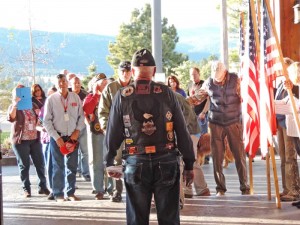Last Updated on February 26, 2025 by MASSAGE Magazine
When veterans come back from war, wounds that cannot be seen often return with them. Today, the impact of post-traumatic stress disorder (PTSD) on U.S. veterans is understood more than in the past. Of veterans who have served in the most recent operations, Iraqi Freedom and Enduring Freedom, in locations including Afghanistan and Iraq, between 11 and 20 percent have returned with PTSD, according to the U.S. Department of Veterans Affairs.
For many veterans, healing opportunities are available.
One nonprofit providing assistance to war veterans is the National Veterans Wellness and Healing Center in Angel Fire, New Mexico. Tucked into the Sangre de Cristo Mountains, the center is for PTSD-afflicted veterans and their spouses to experience a week of complementary therapies.
The center provides couples free getaways where nontraditional healing methods are offered, including massage, yoga, equine therapy and reiki.
Touching PTSD
“Massage therapy is extremely popular among our retreat attendees and is a very important component of helping couples relax and start to release the tension and emotions that are part of post-traumatic stress,” said Rick Sprott, a board member of the National Veterans Wellness and Healing Center.
Founded in 2009, the program was the vision of Army veteran Chuck Howe, who worked with a psychologist to develop it.
“The outcome is phenomenal, and to watch the healing that starts almost the first night makes the whole program worthwhile,” said Howe, who recently worked with New Mexico’s legislature to use stimulus money to fund the program at a level of $350,000 a year for four years. Since opening, the center has helped 249 couples.
The first few days of the program, when veterans’ stress is highest, includes welcoming ceremonies and equine therapy. Additional therapies offered throughout the week include art therapy, guided imagery, acupuncture and Native American ceremonies.
Overcoming Doubt
Colorado resident and Navy veteran Noel Wellborn didn’t like the idea of being touched. Prior to attending a retreat in 2014, he had never gotten a massage.
After a few days, he and his wife had the option of exploring massage. Reluctant but curious, Wellborn decided to receive a session, joking that relaxing with a stranger touching you must be “voodoo.”

Veterans arrive at a retreat at the National Veterans Wellness and Healing Center.
After receiving therapeutic touch, his perspective has changed. “It’s such an emotional experience. If they didn’t have [massage], you wouldn’t be able to relax,” said Wellborn. “You’re clearing your whole body with that massage because it relaxes you and lets that negative energy out.”
He came out a changed man, he said. Both he and his wife, Yvette, get massages regularly now.
“It lets things out and you were able to release things that you were holding in for 40 years,” the veteran said of his massage experience. “Each day got better with the massages.”
Feeling Again
Massage therapist Kathy Dunbar, L.M.P., isn’t surprised when she works with a veteran and finds he or she has a hard time letting go. When she isn’t working at her own practice, The Body Mechanic, she can be found doing craniosacral therapy on veterans at retreats several times a year.
“Some of them want specific work on problem areas,” Dunbar said. “They’re too much on edge. We try to get them to relax and let go and listen to their body as opposed to being disassociated [from] it.”
The nature of craniosacral work is noninvasive, and because many veterans hold tension at the base of their skulls, Dunbar finds addressing the nervous system with craniosacral work restores balance in ways working individual muscles does not.
While some veterans enjoy the massage, not all are open-minded. War vets often avoid touch, said Dunbar, so she advises that other massage professionals be mindful of this if they have a war veteran as a client. Often, Dunbar can’t get retreat vets to let her massage more than their feet or hands, she said, but added she’s OK with that.
“There’s so much in their head and their thoughts—for them to feel their body again is very healing overall,” Dunbar said. “I think one of the most important things is for them to know that someone really cares about them and their situation … I think that aside from the massage, that is the number one [key].”
About the Author
Seraine Page is an award-winning freelance journalist who specializes in lifestyle, wellness and feature stories. She has written for the Kitsap Sun, Bremerton Patriot, Coastal Courier and other publications. She’s the former editor of Liberty Life Magazine. She loves a good massage and sharing her knowledge of well-being with others.

